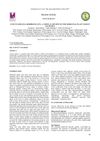 June 2024 in “Korean Journal of Pharmacognosy”
June 2024 in “Korean Journal of Pharmacognosy” The compound from Rhododendron mucronulatum roots may help treat male pattern hair loss.
 July 2024 in “Annals of Phytomedicine An International Journal”
July 2024 in “Annals of Phytomedicine An International Journal” Herbal ingredients like aloe vera and hibiscus can help with hair problems like hair loss and dandruff.
 February 2023 in “Asian journal of pharmaceutical research and development”
February 2023 in “Asian journal of pharmaceutical research and development” Flavonoids in Iraqi marshland plants have potential health benefits like antioxidant and anti-inflammatory effects.
 26 citations,
November 2002 in “Planta medica”
26 citations,
November 2002 in “Planta medica” Extracts from Cercidiphyllum japonicum wood can stimulate mouse hair cell growth like common hair growth treatments.
 September 2022 in “Frontiers in Bioengineering and Biotechnology”
September 2022 in “Frontiers in Bioengineering and Biotechnology” Taxifolin from Rhododendron mucronulatum may help prevent hair loss and promote hair growth.
 14 citations,
April 2018 in “ACS Biomaterials Science & Engineering”
14 citations,
April 2018 in “ACS Biomaterials Science & Engineering” Nanoemulsion is a promising method for delivering luteolin to promote hair growth without minoxidil's side effects.
 4 citations,
December 2017 in “International journal of research in ayurveda and pharmacy”
4 citations,
December 2017 in “International journal of research in ayurveda and pharmacy” The dodder plant has anti-inflammatory, antimicrobial properties, and may promote hair growth.
 37 citations,
January 2015 in “Evidence-based Complementary and Alternative Medicine”
37 citations,
January 2015 in “Evidence-based Complementary and Alternative Medicine” An extract from Quercus acutissima bark was found to reduce sebum production and block an enzyme linked to acne.
 15 citations,
November 2015 in “Journal of Cosmetic Dermatology”
15 citations,
November 2015 in “Journal of Cosmetic Dermatology” Botanicals like green tea extract show potential for hair growth, but more research is needed.
 May 2024 in “EAS Journal of Pharmacy and Pharmacology”
May 2024 in “EAS Journal of Pharmacy and Pharmacology” Pomegranate peel compounds may help treat hair loss.
December 2024 in “International Journal of Scientific Reports” The plant-based hair serum is a promising and safe alternative to minoxidil for hair regrowth.
 79 citations,
March 1999 in “The journal of investigative dermatology/Journal of investigative dermatology”
79 citations,
March 1999 in “The journal of investigative dermatology/Journal of investigative dermatology” Procyanidin compounds from grape seeds were found to significantly increase mouse hair growth.
September 2023 in “International journal of molecular sciences” Pinus densiflora extract may help improve memory and reduce brain inflammation.
 1 citations,
January 2017 in “Elsevier eBooks”
1 citations,
January 2017 in “Elsevier eBooks” The document concludes that new treatments for hair loss may involve a combination of cosmetics, clinical methods, and genetic approaches.
 January 2024 in “Biological & clinical sciences research journal”
January 2024 in “Biological & clinical sciences research journal” Apigenin, found in plants and vegetables, has many health benefits, including anti-inflammatory, antioxidant, and anticancer effects.
 39 citations,
September 2016 in “Expert Opinion on Drug Delivery”
39 citations,
September 2016 in “Expert Opinion on Drug Delivery” New drug delivery methods can make natural compounds more effective and stable.
 January 2024 in “Regenerative Biomaterials”
January 2024 in “Regenerative Biomaterials” Metal organic frameworks-based scaffolds show promise for tissue repair due to their unique properties.
 14 citations,
October 2020 in “Journal of ethnopharmacology”
14 citations,
October 2020 in “Journal of ethnopharmacology” Lepidium sativum seed extracts helped reduce inflammation and improve insulin response in obese rats on a high-fat diet.
 July 2024 in “Science and Culture”
July 2024 in “Science and Culture” Thuja orientalis L. has many health benefits and could be used in new medicines.
 December 2023 in “Frontiers in microbiology”
December 2023 in “Frontiers in microbiology” Mannan oligosaccharides improve raccoon dogs' fur quality and overall health.

New treatments for hair loss should target eight main causes and use specific plant compounds and peptides for better results.
 January 2025 in “Current Issues in Molecular Biology”
January 2025 in “Current Issues in Molecular Biology” Certain plant extracts may help prevent hair loss and promote hair growth safely.
 April 2024 in “Histochemistry and cell biology”
April 2024 in “Histochemistry and cell biology” N-acetylcysteine may prevent hair loss caused by chemotherapy.
 October 2022 in “Legume Research”
October 2022 in “Legume Research” The research found a way to grow plant tissue and analyze compounds in Bituminaria bituminosa, which is promising for hair restoration treatments.
 9 citations,
November 2022 in “Applied sciences”
9 citations,
November 2022 in “Applied sciences” Marine algae compounds may improve skin health and promote hair growth.
 19 citations,
July 2018 in “Medicines”
19 citations,
July 2018 in “Medicines” Juniperus plants contain compounds with potential for developing various medical treatments.
 5 citations,
September 2022 in “Antioxidants”
5 citations,
September 2022 in “Antioxidants” A substance from Caulerpa racemosa seaweed may protect against skin damage caused by air pollution by reducing oxidative stress and cell death.
 18 citations,
December 2021 in “Foods”
18 citations,
December 2021 in “Foods” Seaweeds contain beneficial compounds with potential uses in food, cosmetics, and health, but more research is needed to improve extraction and safety.
16 citations,
January 2019 in “Pharmaceutical biology” Lespedeza cuneata extract may help treat enlarged prostate.
12 citations,
November 2012 in “Bulletin of experimental biology and medicine” Taxifolin-based treatments help skin heal after chemical burns.


























